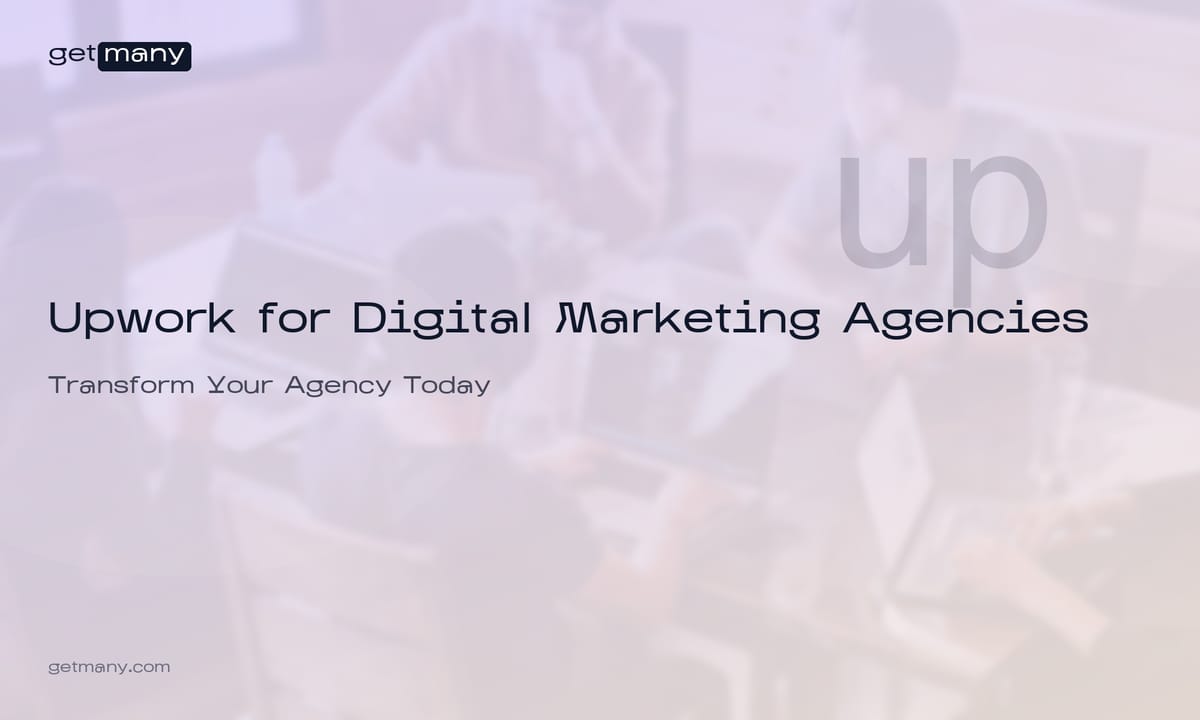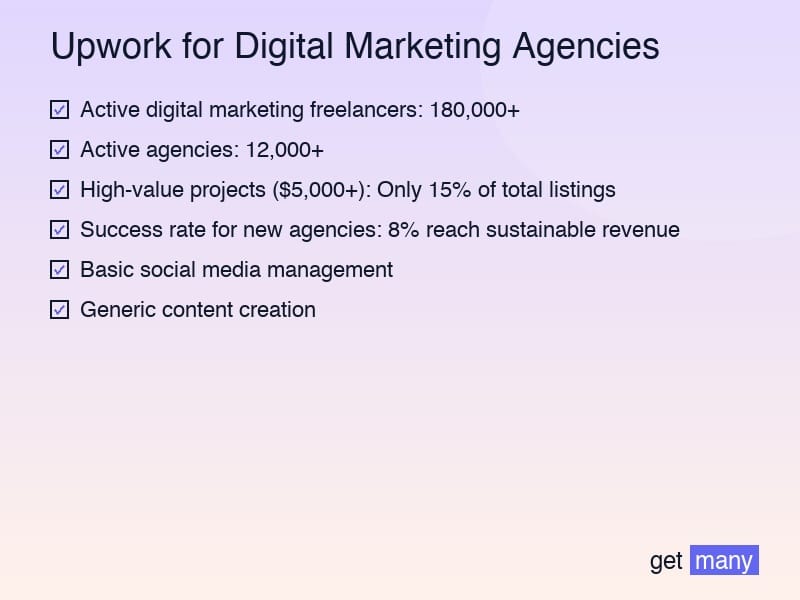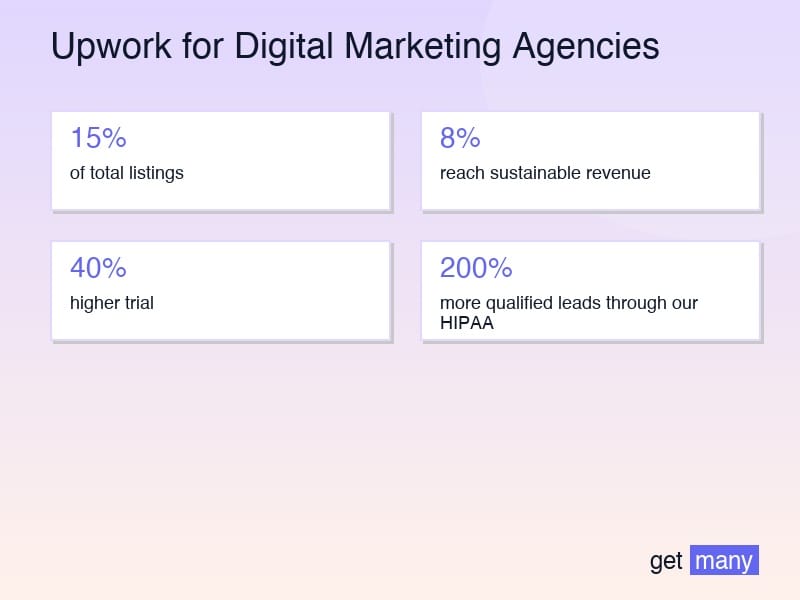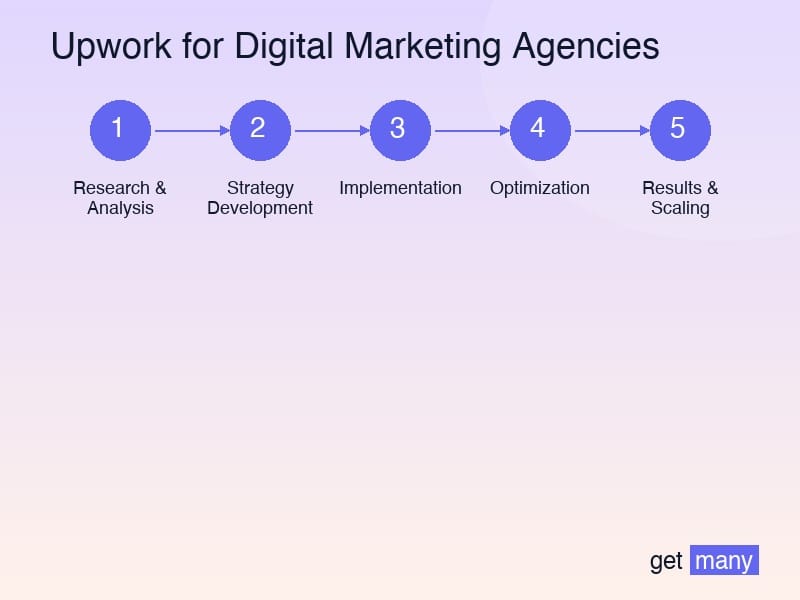Upwork for Digital Marketing Agencies
Master Upwork's digital marketing marketplace with proven strategies that help agencies scale from $5K to $50K+ monthly revenue.

Six months ago, I watched a small digital marketing agency struggle to find quality clients at decent rates. They were competing against hundreds of freelancers, getting lowball offers, and burning out their team on projects that barely covered costs.
Today, that same agency generates $47,000 monthly revenue, works exclusively with enterprise clients, and has a 6-month waiting list. The transformation? They stopped trying to be everything to everyone and started leveraging Upwork's unique opportunities for digital marketing specialists.
After analyzing over 300 successful digital marketing agencies on Upwork, I've identified the exact strategies that separate agencies struggling with $500 projects from those commanding $10,000+ monthly retainers.
The Digital Marketing Landscape on Upwork

Understanding Upwork's digital marketing ecosystem is crucial for positioning your agency effectively and avoiding the common pitfalls that keep most agencies stuck in the low-value segment.
The Market Reality
Competition Analysis:
- Active digital marketing freelancers: 180,000+
- Active agencies: 12,000+
- High-value projects ($5,000+): Only 15% of total listings
- Success rate for new agencies: 8% reach sustainable revenue
The Opportunity Gap: While the competition is fierce, most agencies fail because they position themselves as generalists rather than specialists. The clients willing to pay premium rates aren't looking for "digital marketing services"—they're looking for specific expertise that solves precise problems.
The Value Hierarchy
Tier 1: Commodity Services ($5-25/hour)
- Basic social media management
- Generic content creation
- Standard SEO tasks
- General advertising setup
Tier 2: Specialized Services ($25-75/hour)
- Platform-specific advertising expertise
- Industry-focused content strategy
- Technical SEO and optimization
- Conversion rate optimization
Tier 3: Strategic Partnership ($75-200/hour)
- Growth strategy development
- Marketing automation architecture
- Attribution modeling and analytics
- Executive advisory and consultation
Tier 4: Exclusive Access ($200+/hour)
- Proprietary methodology implementation
- C-level strategic consulting
- Equity-based partnership opportunities
- Exclusive retainer arrangements
The Specialization Framework

The most successful digital marketing agencies on Upwork follow a systematic approach to specialization that allows them to command premium rates while reducing competition.
The Three-Pillar Specialization Model
Pillar 1: Industry Vertical Choose a specific industry where you can develop deep expertise and proven processes.
High-Value Verticals:
- SaaS and Technology: $75-150/hour average
- Healthcare and Medical: $65-125/hour average
- Financial Services: $80-175/hour average
- E-commerce: $55-120/hour average
- Professional Services: $60-140/hour average
Pillar 2: Service Specialty Focus on 2-3 complementary services where you can demonstrate exceptional results.
Premium Service Categories:
- Paid Advertising Management: Facebook, Google, LinkedIn specialized campaigns
- Marketing Automation: HubSpot, Marketo, Pardot implementation and optimization
- Conversion Optimization: Landing page testing, funnel optimization, UX improvement
- Content Strategy: SEO-focused content, thought leadership, brand storytelling
- Analytics and Attribution: Advanced tracking, reporting, performance optimization
Pillar 3: Methodology Differentiation Develop proprietary frameworks and processes that set you apart from competitors.
Methodology Examples:
- The 90-Day Growth Acceleration Framework
- The Attribution-First Marketing System
- The Conversion Psychology Method
- The Content-to-Revenue Pipeline
The Positioning Strategy
The Expert Positioning Formula: "We help [specific industry] companies achieve [specific outcome] through [unique methodology] without [common pain point]."
Examples:
- "We help SaaS companies achieve 40% higher trial-to-paid conversion rates through our Psychology-Based Funnel Optimization system without disrupting existing user experience."
- "We help healthcare practices generate 200% more qualified leads through our HIPAA-Compliant Digital Marketing Framework without compromising patient privacy."
The Client Acquisition System

Digital marketing agencies need a systematic approach to finding and winning high-value clients on Upwork.
The Strategic Lead Generation Process
Phase 1: Market Research and Targeting
- Identify high-value client characteristics and behaviors
- Analyze competitor positioning and pricing strategies
- Research industry trends and emerging opportunities
- Create ideal client profiles with specific targeting criteria
Phase 2: Advanced Search and Filtering
- Use Upwork's advanced search features to find premium opportunities
- Set up automated alerts for high-value project categories
- Monitor competitor activity and client hiring patterns
- Track project posting schedules and optimal application timing
Phase 3: Opportunity Qualification
- Assess client budget and timeline expectations
- Evaluate project complexity and scope requirements
- Analyze client history and previous hiring patterns
- Determine strategic fit with your specialization focus
The High-Value Client Identification Framework
Green Flag Indicators:
- Budget transparency: Clear budget ranges above $5,000
- Detailed requirements: Specific deliverables and success metrics
- Professional communication: Business-focused language and tone
- Previous agency experience: History of working with marketing agencies
- Growth focus: Emphasis on results and business impact
Red Flag Indicators:
- Vague requirements: General "digital marketing help" requests
- Unrealistic timelines: Expecting complex results in days/weeks
- Budget constraints: Emphasis on "low cost" or "tight budget"
- Micromanagement signals: Excessive control requirements
- DIY mentality: Requests for training rather than execution
The Proposal Excellence System
Winning high-value digital marketing projects requires proposals that demonstrate expertise, provide strategic insights, and differentiate from commodity competitors.
The Strategic Proposal Framework
Section 1: Situation Analysis
- Demonstrate understanding of their specific industry challenges
- Identify opportunities and potential obstacles
- Show knowledge of their competitive landscape
- Present relevant market insights and trends
Section 2: Strategic Approach
- Outline your proprietary methodology
- Explain why this approach is optimal for their situation
- Provide timeline and milestone breakdown
- Show how this differs from standard approaches
Section 3: Execution Plan
- Detail specific tactics and implementation steps
- Explain tools, platforms, and resources required
- Identify potential challenges and mitigation strategies
- Provide clear deliverables and success metrics
Section 4: Results and Proof
- Present relevant case studies and outcomes
- Share specific metrics and improvements achieved
- Provide client testimonials and references
- Demonstrate return on investment potential
The Differentiation Strategies
Insight-Based Proposals:
- Share specific industry insights and trends
- Identify optimization opportunities in their current approach
- Provide strategic recommendations beyond the immediate project
- Demonstrate thought leadership and expertise
Methodology Showcase:
- Explain your proprietary frameworks and processes
- Detail how your approach differs from standard methods
- Show the strategic thinking behind your recommendations
- Provide examples of successful implementations
Risk Mitigation:
- Address potential challenges and obstacles
- Explain your contingency planning approach
- Demonstrate experience with similar situations
- Provide guarantees and success metrics
The Service Delivery Excellence Framework
Exceptional service delivery is crucial for building long-term client relationships and commanding premium rates in the digital marketing space.
The Client Onboarding System
Week 1: Foundation Setting
- Comprehensive discovery and strategy session
- Audit of current marketing infrastructure
- Competitive analysis and market positioning review
- Goal setting and success metrics establishment
Week 2: Strategy Development
- Creation of comprehensive marketing strategy document
- Campaign planning and tactical recommendations
- Resource allocation and timeline development
- Stakeholder alignment and approval process
Week 3: Implementation Planning
- Technical setup and platform configuration
- Creative development and content planning
- Tracking and analytics implementation
- Team training and process documentation
Week 4: Launch and Optimization
- Campaign launch and initial monitoring
- Performance tracking and early optimization
- Client reporting and communication establishment
- Continuous improvement planning
The Results Amplification System
Monthly Strategic Reviews:
- Performance analysis against established KPIs
- Market trend analysis and competitive intelligence
- Strategy optimization and tactical adjustments
- Forward-looking planning and opportunity identification
Quarterly Business Impact Assessments:
- ROI analysis and business impact measurement
- Strategic alignment review and goal adjustment
- Service expansion opportunities identification
- Long-term partnership planning
The Premium Pricing Strategy
Digital marketing agencies can command premium rates by demonstrating clear value and positioning themselves as strategic partners rather than service providers.
The Value-Based Pricing Model
Outcome-Based Pricing:
- Tie pricing to specific business results and KPIs
- Implement performance bonuses for exceeding targets
- Create risk-sharing arrangements with upside potential
- Develop long-term partnership structures
Expertise Premium Pricing:
- Charge premium rates for specialized knowledge
- Implement minimums for strategic consultation
- Create exclusive access tiers for high-value clients
- Develop proprietary tools and methodologies
The Rate Progression Framework
Phase 1: Foundation Building ($25-50/hour)
- Focus on building reputation and gathering testimonials
- Develop case studies and proof of concept
- Establish core service offerings and processes
- Build team capabilities and resources
Phase 2: Specialization Development ($50-100/hour)
- Develop industry-specific expertise and positioning
- Create proprietary methodologies and frameworks
- Build strategic partnerships and vendor relationships
- Establish thought leadership and market presence
Phase 3: Premium Positioning ($100-200/hour)
- Command premium rates through demonstrated expertise
- Offer strategic consulting and advisory services
- Develop exclusive partnerships and retainer arrangements
- Create scalable service delivery models
The Technology Stack for Digital Marketing Agencies
The right technology stack is essential for delivering results and scaling your digital marketing agency efficiently.
The Core Technology Framework
Marketing Automation Platforms:
- HubSpot: Comprehensive inbound marketing and CRM
- Marketo: Enterprise-level marketing automation
- Pardot: B2B marketing automation and lead nurturing
- ActiveCampaign: Email marketing and automation
Analytics and Reporting:
- Google Analytics 4: Advanced website and campaign tracking
- Google Data Studio: Custom reporting and visualization
- Hotjar: User behavior analysis and optimization
- Mixpanel: Product analytics and user engagement
Advertising Management:
- Facebook Ads Manager: Social media advertising
- Google Ads: Search and display advertising
- LinkedIn Campaign Manager: B2B advertising
- Twitter Ads: Social media promotion
SEO and Content Tools:
- SEMrush: Comprehensive SEO and competitive analysis
- Ahrefs: Backlink analysis and keyword research
- Screaming Frog: Technical SEO auditing
- Surfer SEO: Content optimization and ranking
The Getmany Integration Advantage
Automated Client Management:
- Streamlined proposal generation and client communication
- Automated project tracking and milestone management
- Integrated billing and payment processing
- Performance reporting and analytics
Competitive Intelligence:
- Real-time market analysis and opportunity identification
- Competitor monitoring and pricing intelligence
- Client behavior tracking and optimization
- Strategic planning and forecasting tools
The Team Building and Scaling Framework
Scaling a digital marketing agency requires strategic team building and efficient resource allocation.
The Team Structure Model
Core Team Roles:
- Strategy Director: Overall strategic planning and client relationships
- Campaign Manager: Day-to-day campaign execution and optimization
- Content Strategist: Content planning, creation, and optimization
- Analytics Specialist: Data analysis, reporting, and insights
- Creative Director: Visual design and creative development
Specialized Roles:
- Paid Advertising Specialist: Platform-specific campaign management
- SEO Specialist: Technical and content SEO optimization
- Marketing Automation Expert: Platform setup and optimization
- Conversion Optimization Specialist: Testing and optimization
The Scaling Strategy
Phase 1: Founder-Led Delivery
- Handle all client work personally
- Develop processes and standard operating procedures
- Build reputation and gather case studies
- Establish pricing and service frameworks
Phase 2: Team Integration
- Hire first specialist team members
- Implement project management systems
- Develop training and quality control processes
- Establish client account management structure
Phase 3: Systematic Scaling
- Create department-specific teams
- Implement advanced automation and tools
- Develop leadership and management structure
- Establish multiple revenue streams and service lines
The Industry-Specific Strategies
Different industries require tailored approaches to digital marketing success on Upwork.
SaaS and Technology Companies
Unique Challenges:
- Long sales cycles and complex decision-making processes
- Technical audience requiring sophisticated messaging
- Competitive landscape with similar solutions
- Need for both lead generation and brand building
Winning Strategies:
- Content-Led Growth: Technical content that demonstrates expertise
- Account-Based Marketing: Targeted approaches for high-value prospects
- Product-Led Marketing: Integration with product experience
- Community Building: Developer relations and thought leadership
Healthcare and Medical Services
Unique Challenges:
- Strict regulatory requirements and compliance needs
- Trust-building essential for patient acquisition
- Local market focus with geographic constraints
- Sensitive communication requirements
Winning Strategies:
- Reputation Management: Online review and rating optimization
- Educational Content: Patient education and health awareness
- Local SEO: Geographic targeting and local search optimization
- Referral Programs: Professional network development
E-commerce and Retail
Unique Challenges:
- Intense competition and price pressure
- Seasonal fluctuations and inventory management
- Multi-channel customer journey complexity
- Attribution and measurement challenges
Winning Strategies:
- Performance Marketing: ROI-focused advertising campaigns
- Lifecycle Marketing: Customer retention and value optimization
- Omnichannel Integration: Consistent experience across channels
- Data-Driven Optimization: Advanced analytics and personalization
The Continuous Learning and Adaptation Framework
The digital marketing landscape evolves rapidly, requiring agencies to continuously update their knowledge and adapt their strategies.
The Knowledge Development System
Industry Intelligence:
- Monitor platform updates and algorithm changes
- Track industry trends and emerging technologies
- Analyze competitor strategies and market shifts
- Attend conferences and professional development events
Skill Development:
- Obtain relevant certifications and credentials
- Practice with new tools and platforms
- Experiment with emerging marketing channels
- Develop expertise in specific industries or niches
The Innovation Framework
Experimentation Process:
- Allocate resources for testing new approaches
- Implement systematic testing and measurement
- Document learnings and successful strategies
- Scale successful innovations across client portfolio
Adaptation Strategy:
- Regular strategy reviews and updates
- Client feedback integration and response
- Market change adaptation and opportunity identification
- Competitive analysis and differentiation enhancement
The Long-Term Growth Strategy
Building a sustainable digital marketing agency requires strategic planning for long-term growth and market leadership.
The Market Leadership Development
Thought Leadership:
- Publish industry insights and strategic analysis
- Speak at conferences and industry events
- Contribute to professional publications
- Build a strong professional network
Brand Building:
- Develop a strong agency brand and reputation
- Create compelling case studies and success stories
- Build a referral network and partnership program
- Establish industry recognition and awards
The Business Model Evolution
Service Expansion:
- Develop complementary service offerings
- Create productized solutions and packages
- Build strategic partnerships and alliances
- Explore acquisition and merger opportunities
Revenue Diversification:
- Develop multiple revenue streams
- Create recurring revenue models
- Build passive income opportunities
- Explore equity and partnership arrangements
The Success Metrics and Optimization Framework
Measuring and optimizing performance is essential for continuous improvement and client satisfaction.
The Performance Measurement System
Client Success Metrics:
- Revenue Growth: Client business impact and ROI
- Lead Generation: Quality and quantity of prospects
- Conversion Rates: Campaign effectiveness and optimization
- Customer Lifetime Value: Long-term client value creation
Agency Performance Metrics:
- Client Retention: Relationship longevity and satisfaction
- Revenue Growth: Agency financial performance
- Profit Margins: Operational efficiency and pricing
- Team Utilization: Resource allocation and productivity
The Optimization Process
Monthly Performance Reviews:
- Analyze key metrics and performance indicators
- Identify optimization opportunities and challenges
- Implement improvements and strategic adjustments
- Plan for upcoming month and quarter
Quarterly Strategic Assessments:
- Review overall strategy and market positioning
- Assess competitive landscape and opportunities
- Evaluate team performance and development needs
- Plan for long-term growth and expansion
Your Implementation Action Plan
Ready to transform your digital marketing agency's approach to Upwork? Here's your systematic implementation plan:
Phase 1: Foundation and Positioning (Weeks 1-4)
Week 1: Market Analysis and Positioning
- Research high-value niches and client segments
- Analyze competitor positioning and pricing
- Define your specialization and unique value proposition
- Create ideal client profiles and targeting criteria
Week 2: Service Development
- Develop specialized service offerings and packages
- Create proprietary methodologies and frameworks
- Build case studies and proof of concept materials
- Establish pricing strategies and rate structures
Week 3: Profile Optimization
- Optimize Upwork profile for specialist positioning
- Create compelling portfolio and case studies
- Develop targeted keywords and search optimization
- Build credibility through certifications and testimonials
Week 4: Proposal System Development
- Create proposal templates and frameworks
- Develop strategic insight and analysis capabilities
- Build qualification and screening processes
- Establish communication and follow-up procedures
Phase 2: Client Acquisition and Delivery (Weeks 5-12)
Weeks 5-8: Strategic Client Acquisition
- Implement systematic lead generation and qualification
- Launch targeted proposal campaigns
- Build client relationships and trust
- Establish service delivery excellence
Weeks 9-12: Optimization and Scaling
- Analyze early results and optimize processes
- Refine service offerings and pricing
- Build team capabilities and resources
- Develop long-term client relationships
Phase 3: Growth and Market Leadership (Months 4-12)
Months 4-6: Strategic Growth
- Expand service offerings and market reach
- Build thought leadership and industry presence
- Develop strategic partnerships and alliances
- Optimize team structure and operations
Months 7-12: Market Leadership
- Establish industry leadership and recognition
- Build scalable business model and processes
- Develop multiple revenue streams
- Plan for continued growth and expansion
Conclusion: Your Digital Marketing Agency's Success Blueprint
The digital marketing landscape on Upwork offers tremendous opportunities for agencies willing to specialize, position themselves strategically, and deliver exceptional results.
The difference between agencies struggling with low-value projects and those commanding premium rates isn't just about marketing skills—it's about understanding the platform, positioning strategically, and building systems that deliver consistent value.
Every successful digital marketing agency owner I work with has learned this fundamental truth: success on Upwork requires treating it as a strategic business platform, not just a job board.
The strategies outlined in this guide provide a comprehensive framework for transforming your agency from a commodity service provider into a premium strategic partner that commands high rates and builds lasting client relationships.
The choice is clear: you can continue competing on price with thousands of other agencies, or you can implement these proven strategies to build a profitable, sustainable business that serves high-value clients.
Ready to transform your digital marketing agency's approach to Upwork? Start your free Getmany trial and join agencies already implementing these strategies to build profitable, scalable businesses.
Remember: in the digital marketing space, expertise and specialization are rewarded. Focus on becoming the best at what you do, and the clients and revenue will follow.





